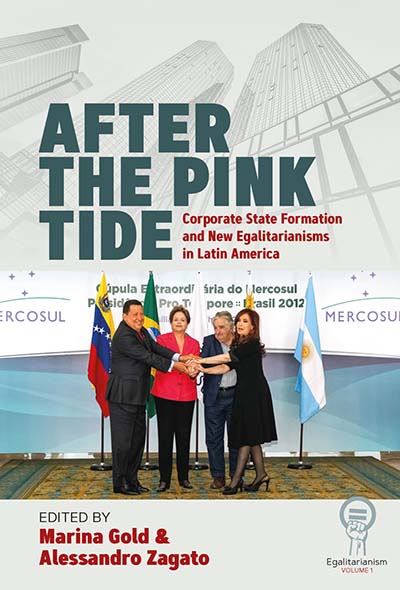
Series
Volume 1
Egalitarianism
Email Newsletters
Sign up for our email newsletters to get customized updates on new Berghahn publications.
After the Pink Tide
Corporate State Formation and New Egalitarianisms in Latin America
Edited by Marina Gold and Alessandro Zagato
Afterword by Bruce Kapferer
Full Text PDF | Full Text ePUB Made available under a CC BY-NC-ND 4. license with support from the University of Bergen.
218 pages, bibliog., index
ISBN 978-1-78920-657-9 $135.00/£104.00 / Hb / Published (March 2020)
ISBN 978-1-78920-876-4 $19.95/£15.95 / Pb / Published (March 2020)
Reviews
“The editors' introductory and concluding essays summarize the fruitful theoretical basis of the case studies, citing especially Kapferer’s work on the emergence and dominance of the ‘corporate state.’ Highly Recommended." • Choice
“This is a superb and timely set of studies that assess the lasting effects of a recent trend, now subsided, of left and left-leaning governments on politics and daily life for common people in a range of Latin American societies.” • George E. Marcus, University of California
“To my mind, there are no other books or works on Latin America that have this double focus on the corporate state and egalitarianism. In sum, the book provides a wealth of novel arguments to understand the rise, maturation and afterlife of one of the most important and complex political turns to the left after the year 2000” • Bjorn Enge Bertelsen, University of Bergen
Description
The left-wing Pink Tide movement that swept across Latin America seems now to be overturned, as a new wave of free-market thinkers emerge across the continent. This book analyses the emergence of corporate power within Latin America and the response of egalitarian movements across the continent trying to break open the constraints of the state. Through an ethnographically grounded and localized anthropological perspective, this book argues that at a time when the regular structures of political participation have been ruptured, the Latin American context reveals multiple expressions of egalitarian movements that strive (and sometimes momentarily manage) to break through the state’s apparatus.
Marina Gold is an Associated Researcher at the University of Zurich. Her research topics and recent publications include People and State in Socialist Cuba: Ideas and Practices of Revolution (2015, Palgrave) and a critical review of the moral turn in anthropology, Moral Anthropology. A Critique, co-ed. Bruce Kapferer (2018, Berghahn Books).
Alessandro Zagato is the founder of the Research Group in Art and Politics (GIAP) and of the centre of residences for artists and researchers, CASA GIAP, and Latin America’s regional representative for the Artists at Risk Connection program of PEN America. His publications include The Event of Charlie Hebdo: Imaginaries of Freedom and Control (2015, Berghahn Books).
Subject: Political and Economic AnthropologyAnthropology (General)
Area: Latin America and the Caribbean
After the Pink Tide Edited by Marina Gold and Alessandro Zagato is available open access under a Creative Commons Attribution-NonCommercial-NoDerivatives 4.0 International License (CC BY-NC-ND 4.0) with support from the University of Bergen.
Full Text PDF | Full Text ePUB
OA ISBN: 978-1-78920-659-3




